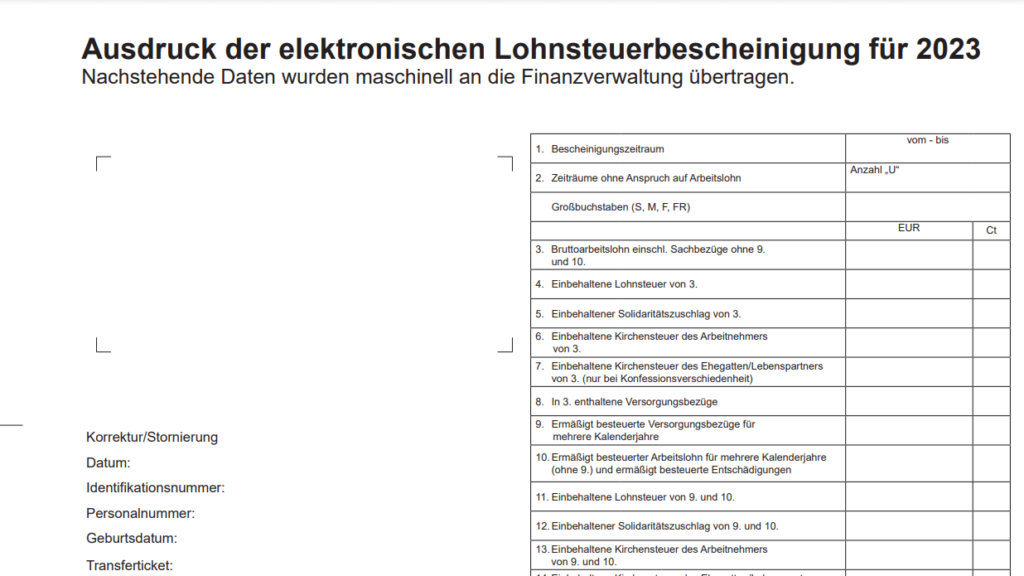Germany’s tax system stands as a cornerstone of the nation’s financial infrastructure, with income tax, or “Einkommensteuer,” playing a pivotal role in supporting public services and fostering a robust national economy. To navigate the intricacies of this system, it’s essential to delve into the German tax landscape, which this article aims to illuminate. By focusing on income tax and providing an in-depth exploration of the broader German tax framework, we intend to equip you with the knowledge necessary for effective financial planning and compliance within this multifaceted system.

1. Progressive Income tax in Germany
Income tax in Germany operates on a progressive tax rate system, which stands in contrast to a flat tax system where all taxpayers, regardless of income, pay the same percentage of their earnings in taxes. In a progressive system, the tax rate increases as an individual’s income level rises, which aims to achieve a fair and equitable distribution of the tax burden across society.
The essence of progressive taxation lies in the principle of ability-to-pay. This means that individuals with higher incomes can afford to contribute a larger portion of their earnings to taxes, while those with lower incomes pay a smaller percentage. The rationale behind this approach is to promote social and economic equity by ensuring that those who can contribute more do so, which in turn funds public services and social programs.
In the German context, the income tax rate system comprises several tax brackets, each associated with a specific rate. As of 2023, the tax brackets and rates are as follows:
- Basic Tax Rate (0%): This rate applies to individuals with income up to €10,908. In other words, if your annual income is within this range, you are not subject to any income tax, ensuring that individuals with very low earnings are not burdened with taxation.
- Progressive Rates (between 0% and 45%): For incomes exceeding €10,908, the tax rates progressively increase. The highest tax bracket, with a 45% rate, is applicable to incomes surpassing €277,826 for single individuals. This upper bracket represents the peak of the progressive system, where higher-income individuals contribute a larger proportion of their earnings to income tax.
This progressive structure aligns with the principles of fairness and redistribution of wealth, attempting to create a tax system that minimizes the financial burden on those with lower incomes while ensuring that higher-income individuals contribute proportionally more to the financing of public services, infrastructure, and the overall functioning of the state.
In practice, this progressive nature of income tax often involves complex tax calculations and considerations, such as deductions, allowances, and tax credits, to determine the final tax liability for each taxpayer. By comprehending the progressive income tax system, individuals can better plan their finances, understand their tax obligations, and explore opportunities for optimizing their tax position within the confines of the law. It’s a fundamental aspect of the German tax system that influences financial decisions and the overall economic landscape.
2. Deductions, Allowances, and Tax Credits for Optimal Income tax Planning
One of the significant strengths of the German tax system lies in the opportunities it provides for taxpayers to reduce their taxable income. Various mechanisms come into play:
2.1 Basic Allowance (Grundfreibetrag)
The Basic Allowance, known as “Grundfreibetrag” in German, is a fundamental concept within the country’s income tax system. It serves as a tax-free threshold, and understanding its significance is crucial for both taxpayers and tax authorities.
2.1.1 Defining the Basic Allowance
The Basic Allowance represents the annual amount of income that an individual can earn without incurring any income tax liability. In essence, it is the starting point of the progressive income tax rate system in Germany. The Basic Allowance acknowledges the principle of subsistence, ensuring that individuals with very low incomes are not burdened with income tax. It reflects the minimum income necessary to cover basic living expenses, such as housing, food, and clothing, and is designed to protect those with limited financial resources.
2.1.2 Annual Adjustment
The Basic Allowance is not a fixed amount but is subject to annual adjustments to account for inflation and changes in the cost of living. As in 2023, the Basic Allowance for single individuals stood at €10,908 per year. For married couples who file joint tax returns, this threshold is usually double, which means that their combined income can reach twice the Basic Allowance without incurring income tax.
2.1.3 Practical Implications
The Basic Allowance plays a pivotal role in the German income tax system, especially for individuals with lower incomes. If your total annual income falls below the current Basic Allowance, you are not required to pay any income tax. This is particularly beneficial for individuals such as students, part-time workers, and retirees who might have limited income.
However, it’s important to note that the Basic Allowance is just one component of the German income tax system. Taxable income is calculated by subtracting allowable deductions, tax reliefs, and other exemptions from the total income. So, even if your income exceeds the Basic Allowance, you may still have opportunities to reduce your taxable income through deductions, such as those for health insurance, pension contributions, or other special expenses.
2.2 Special Expenses Deductions (Sonderausgaben)
Special Expenses Deductions, referred to as “Sonderausgaben” in German, are a significant aspect of the country’s income tax system. These deductions provide taxpayers with the opportunity to reduce their taxable income by claiming various expenses and contributions related to specific life circumstances. Understanding Special Expenses Deductions is essential for optimizing one’s tax position and ensuring accurate tax compliance.
2.2.1 Defining Special Expenses Deductions
Special Expenses Deductions are a category of tax deductions that encompass various expenses and contributions, allowing individuals to reduce their taxable income. These deductions are designed to acknowledge the financial commitments individuals make in certain areas of their lives. They can include a wide range of expenses that go beyond the basic necessities of living, such as housing or food.
2.2.2 Types of Special Expenses Deductions
- Health Insurance Premiums: One of the most common Special Expenses Deductions is related to health insurance premiums. Individuals can deduct the contributions they make to public or private health insurance schemes. This deduction acknowledges the significant cost of healthcare and aims to alleviate the financial burden on taxpayers.
- Pension Contributions: Contributions to retirement and pension plans are also eligible for deduction. These contributions are made to secure financial stability in retirement and reduce the overall tax liability.
- Life Insurance Premiums: Some life insurance premiums may be deductible, especially if the insurance policy is designed to provide for dependents in the event of the taxpayer’s death.
- Donations to Charities: Contributions to charitable organizations or recognized nonprofit entities can often be claimed as deductions. This encourages philanthropic activities and supports charitable causes.
- Work-Related Expenses: Certain work-related expenses, such as union dues or professional membership fees, may be considered Special Expenses Deductions.
- Alimony Payments: Taxpayers making alimony payments may be eligible for deductions, as these payments constitute a financial obligation to support dependents.
2.2.3 Limitations and Conditions
Special Expenses Deductions are subject to specific limitations and conditions. The eligibility and the exact amount that can be deducted may vary depending on the nature of the expense and the taxpayer’s individual circumstances. It’s crucial to keep thorough records and receipts to substantiate the deductions claimed.
2.3 Extraordinary Burdens Deductions (Außergewöhnliche Belastungen)
Extraordinary Burdens Deductions, known as “Außergewöhnliche Belastungen” in German, represent a critical component of the German income tax system. These deductions allow taxpayers to alleviate their tax burden by recognizing and offsetting significant exceptional expenses or financial burdens they may face due to specific circumstances. Understanding the nuances of Extraordinary Burdens Deductions is essential for both financial planning and ensuring accurate tax compliance.
2.3.1 Defining Extraordinary Burdens Deductions
Extraordinary Burdens Deductions pertain to expenses or financial obligations that exceed the typical financial responsibilities of an individual or household. These expenses are considered exceptional in nature and can encompass a wide range of circumstances that impose a heavy financial burden on the taxpayer. The objective of these deductions is to acknowledge and alleviate the financial strain caused by such burdens.
2.3.2 Types of Extraordinary Burdens
- Medical Expenses: Perhaps the most common extraordinary burden, medical expenses that are not covered by health insurance or other means can be claimed as deductions. This includes costs for treatments, surgeries, medications, and medical aids.
- Support for Dependents: Financial support provided to dependents, such as children, elderly parents, or disabled family members, can be claimed as deductions. This recognizes the additional financial responsibility incurred by the taxpayer.
- Disaster and Loss-Related Costs: In the event of natural disasters, accidents, or significant financial losses due to unforeseen circumstances, the costs associated with recovery or mitigation may qualify for deductions.
- Educational Expenses: Educational expenses that are considered extraordinary, such as those incurred for special needs education or exceptional educational circumstances, may be eligible for deductions.
- Funeral Expenses: Costs related to the funeral and burial of a family member or dependent can be considered an extraordinary burden and may be deducted.
2.3.3 Limitations and Conditions
The eligibility and the exact amount that can be deducted as extraordinary burdens depend on several factors, including the nature of the expense, the financial capacity of the taxpayer, and the specific circumstances involved. There are limitations and thresholds set by tax regulations, and it’s important to maintain thorough documentation and evidence to support the deductions claimed.
2.4 Child Allowance (Kindergeld)
Child Allowance, known as “Kindergeld” in German, is a fundamental component of the country’s income tax system designed to support families by providing financial assistance for raising children. Understanding the details of Child Allowance is essential for families to maximize the benefits and financial support available to them.
2.4.1 Defining Child Allowance
Child Allowance is a financial benefit provided by the German government to assist parents in covering the costs of raising children. It is a form of financial support designed to promote family well-being and ensure that the financial demands of child-rearing are manageable for families across different income levels.
2.4.2 Key Features of Child Allowance
- Universal Benefit: Child Allowance is a universal benefit, which means it is available to all parents, regardless of their income, employment status, or other financial circumstances. Both German citizens and foreign residents with children living in Germany are eligible to receive Child Allowance.
- Age Criteria: Child Allowance is generally provided for children up to the age of 18. However, in certain cases, the eligibility age can be extended, such as for children pursuing further education or vocational training.
- Amount of Child Allowance: The amount of Child Allowance does not vary depending on the number of children in the family from 2023. As of 2023, the monthly benefit for each child is €250. Families with more children receive higher Child Allowance amounts to accommodate the additional financial responsibilities.
- Payment Frequency: Child Allowance is typically paid on a monthly basis to eligible parents or legal guardians. The payment is intended to contribute to the various expenses associated with child-rearing, including food, clothing, education, and leisure activities.
- Application Process: To receive Child Allowance, parents must apply for it through the Family Benefits Office (Familienkasse) or the Federal Employment Agency (Bundesagentur für Arbeit), depending on the individual’s employment situation. Application forms are available online or can be obtained from these offices.
- Tax Implications: Child Allowance is considered tax-free income in Germany. It does not count as taxable income for the recipients and does not affect other tax calculations.
2.5 Tax Credits (Steuerermäßigung)
Tax credits, known as “Steuerermäßigung” in German, represent a critical element of the country’s income tax system. These credits provide taxpayers with a way to directly reduce their tax liability and can take various forms, such as deductions or allowances for specific life circumstances or expenses. Understanding the nuances of tax credits is essential for optimizing one’s tax position and ensuring accurate tax compliance.
2.5.1 Defining Tax Credits:
Tax credits in the German income tax system are financial benefits that allow individuals or households to reduce the amount of income tax they owe. Unlike deductions that reduce taxable income, tax credits provide a Euro-for-Euro reduction in the actual tax owed. In essence, they serve as a direct means of lowering one’s tax bill.
2.5.2 Types of Tax Credits
The German income tax system includes several tax credits that cater to various aspects of a taxpayer’s life and financial situation. Some of the notable tax credits include:
- Child Supplement (Kinderzuschlag): Designed to support families with low incomes, the child supplement provides additional financial assistance to parents to ensure that their children have access to essential resources.
- Other Family-Related Credits: There are additional credits and allowances that relate to family circumstances, such as the caregiver allowance (Pflegepauschbetrag) and the caregiver relief amount (Pflegefreibetrag), which support individuals caring for dependents.
- Employment-Related Credits: Some tax credits are linked to employment situations, such as the commuter allowance (Pendlerpauschale), which provides a deduction for commuting expenses, and the wage tax credit (Lohnsteuerausgleich), which helps reconcile income tax overpayments.
- Investment and Savings Credits: These credits encourage savings and investments by allowing taxpayers to deduct certain amounts from their taxable income. For example, the savings allowance (Sparer-Pauschbetrag) provides a tax exemption for interest income up to a certain threshold.
Limitations and Conditions:
The eligibility and exact amount of tax credits can vary depending on the specific credit and the taxpayer’s individual circumstances. Some tax credits may have income limits or other conditions that must be met to qualify for the credit.
3. Conclusion
The German income tax system, or “Einkommensteuer,” is a multifaceted financial framework that underpins the country’s fiscal stability. It is a crucial source of revenue for the government, supporting public services, infrastructure, and social initiatives. Throughout this in-depth exploration of Einkommensteuer, we’ve delved into its intricacies to provide a comprehensive understanding of its various components.
From its progressive tax rate structure to the array of deductions, allowances, and tax credits it offers, the German income tax system is engineered to address the diverse financial needs of its citizens and promote economic fairness. We’ve elucidated concepts like the Basic Allowance (Grundfreibetrag), Special Expenses Deductions (Sonderausgaben), Extraordinary Burdens Deductions (Außergewöhnliche Belastungen), Child Allowance (Kindergeld), and Tax Credits (Steuerermäßigung) that collectively define the financial landscape for individuals and families.
This comprehensive grasp of Einkommensteuer is not only advantageous but also essential for effective financial planning and adherence to the German tax system. Whether your aim is to minimize your tax liability, ensure legal compliance, or optimize your financial standing, understanding this system is pivotal. As the German tax framework evolves to respond to societal and economic changes, remaining informed and current is crucial. Seek guidance from tax professionals and authorities to navigate this dynamic landscape effectively.
In conclusion, Einkommensteuer is not merely a financial obligation but a means to informed financial decision-making, ensuring compliance, and contributing to the prosperity of the nation. It mirrors Germany’s commitment to a just and equitable tax system, reinforcing the social and economic fabric of the nation.


